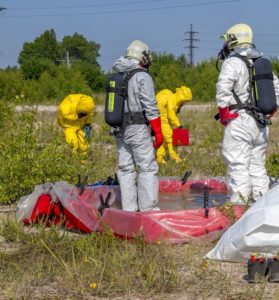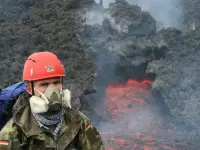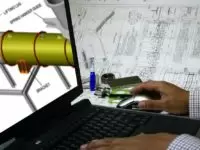
A Decontamination Technician or Decommissioning Technician works in the nuclear industry and anywhere else where there may be hazardous materials. Their role is essential in ensuring safe practice for employees, processes and safe disposal of dangerous material.
What Does a Decontamination Technician Do?
Mostly they work in the nuclear industry. Nuclear energy is one of the many forms of power generation used in the US and across the developed world. It has enabled us to produce near limitless cheap energy for our homes and businesses. Despite the safety precautions taken and needed to be taken, there is an unfortunate side effect. Nuclear power is potentially one of the most dangerous forms of power generation. That is why the nuclear industry requires Decontamination Technicians and Decommissioning Technicians alongside nuclear engineers.
The nuclear industry is not the only place where Decontamination Technicians might work. They can also work in the clean-up, removal and decontamination of other hazardous and toxic materials such as asbestos and older paints containing lead, waste fuel and oil. They can work in the construction and demolition industry. They may work in government, private bodies or by charities using environmental clean-up teams for major disasters (Fukushima, the BP spill). They work, essentially, in an area of public health concerned with hazardous materials.
Where Does a Decontamination Technician Work?
Their roles are quite varied and which materials they work with will often determine where they work. The majority of Decontamination or Decommissioning Technicians work in private companies for government bodies or private organizations, specialists in handling, storage and disposal of waste material. These bodies employ some three quarters of individuals qualified to handle waste material. They will work with a range of material from oil and fuel, paints and household chemicals, industrial treatment substances and others deemed unsafe for public health.
The second largest employer is the construction industry, employing around 10% of Decontamination / Decommissioning Technicians. Those who work in this area will generally find they work with toxic building materials such as asbestos more often than any other substance, but it will include others discovered on sites - either as a result of accident during construction or materials found during the building or demolition process.
The third biggest employer is government (around 5%), typically in environmental remediation, public health and clean up in line with legal requirement. In some cases, they may work as advisors to environmental lawyers in bringing court cases for criminal negligence against polluting businesses.
What Is the Average Decontamination Technician Salary?
The median pay for this group of professionals was $45,270 as of May 2020. The range of salaries is as low as $30,590 (lowest 10%) and a high as $76,570 (highest 10%). The highest paid decontamination technicians work in the construction industry, where they earn a median salary of $45,830.*
Decontamination Jobs & Job Description
Decontamination technicians may perform work under rigorous conditions in a laboratory environment, or in the field if there has been a spill or contamination that needs to be addressed. While the role might appear different, decontamination techs adhere to rigorous procedures as well as tight deadlines. Below are some of the jobs that may be required from day to day in the field:
- Undertake lab or field tests and surveys to collect data on the immediate conditions
- Identify sources of pollution or contamination
- Classify and evaluate sources of pollution and the effects of such
- Clean, test, calibrate and maintain lab and field decontamination tools
- Perform sampling activities to provide report data
- Assis in health and safety programming
- Prepare reports for review by senior staff
- Identify gaps in process and work to remediate
- Supply sterile goods to all areas of the facility/field
- Maintain appropriate supplies for decontamination
- Act as a resource for others regarding policies, best practices and problems
- Use protective attire at all times
- Complete training and education according to team and company standard
- Follow the direction of scientists, engineers, or administrative team leads
- Work to continuously improve protocols and systems for maximum efficacy and minimum costs
Decontamination technician managers are adept at solving problems, combatting novel contamination situations using innovative and exacting processes. These individuals may find themselves with a team reporting to them, and will likely encounter the following in their scope of duties:
- Manage training for work groups and end-users to conform to initial processing stages
- Manage manufacturer relationships for instrument parameters
- Analyze and approve protocols for identifying and managing problems as they occur
- Participate in safety and infection control policy creation or updates
- Obtain and monitor data reports
- Inspect discharge systems, waste conveyance and infection control systems
- Audit equipment that leaves or enters the site
- Use leadership and strong processes to create a strong health and safety culture
- Monitor disposal procedures and ensure procedures follow regulatory controls
- Prepare written reports for submittal to stakeholders and administrative team
What Is the Job Demand for Decontamination Technician?
The job demand for the role of Decontamination / Decommissioning Technician is expected to grow by 7% between 2020 and 2030.*
Demand for nuclear decontamination could see a surge during this decade but BLS has not made the figures available. As older nuclear facilities close and are replaced by new nuclear power plants or renewables, a demand for this role may increase by more than the expected average. These jobs will depend on available Federal funding for the clean-up.
What Are the Education Requirements to Become a Decontamination Technician?
There are no formal education requirements to enter this type of career beyond the High School Diploma. However, candidates will receive on the job training and will need to become professionally certified. A minimum 40 hours of training in the OSHA (Occupational Safety & Health Administration) will be required. In some cases, you will need special certification - especially when handling nuclear waste; these roles will also require extra training and certification on top of the 40 hour OSHA. Requirements vary by state so check the regulations of your state or your intended state of residence.
An Associate's Degree will be advantageous to those wishing to work with nuclear waste. Although not essential, it may lead to other career options such as management, running your own project and eventually, advisory roles.
Decontamination Technician - Related Degrees
What Kind Of Societies and Professional Organizations Do Decontamination Technicians Have?
The following professional organizations are for “Haz Mat” disposal and handling professional:
- EPA: The country's largest regulatory body on hazardous materials, pollution regulation, environmental law and more. They certify organizations that provide training and education for people in this role.
- DOE: The mission of the Department of Energy is to ensure prosperity, energy security and safety in line with government regulation. They are involved in public education and one of the largest employers of Decontamination and Decommissioning Technicians
- Nuclear Regulatory Commission: Individuals wishing to enter into the three-month training program for certification of nuclear waste disposal must apply through the NRC. Their remit is to ensure good practice in protecting people and the environment from nuclear waste
*2020 US Bureau of Labor Statistics salary figures and job growth projections for hazardous materials removal workers reflect national data not school-specific information. Conditions in your area may vary. Data accessed September 2021.





